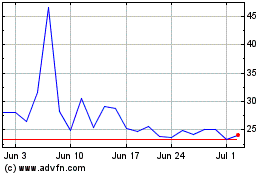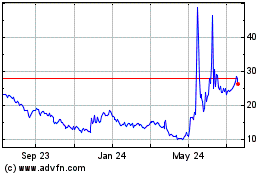GameStop Trading Restrictions Blamed on Wall Street's Clearing Firm by Online Broker
January 28 2021 - 4:21PM
Dow Jones News
By Caitlin McCabe
The chief executive of popular online brokerage Webull Financial
LLC said Thursday that the restrictions placed on trading GameStop
Corp. and other highflying stocks rested with the platform's
clearing firm that helps streamline trades.
Anthony Denier, Webull's CEO, said in an interview that he was
told Thursday morning by his clearing firm, Apex Clearing Corp.,
that Webull needed to shut off the ability to open new positions in
certain stocks, otherwise the clearing firm wouldn't be able to
settle the trade. Apex Clearing, Mr. Denier said, was told by the
Depository Trust & Clearing Corp. that it would need to put up
more collateral to help facilitate the settling of trades. That
message, he said, was then passed down to Webull, where individual
investors can trade securities such as stocks for free.
Apex couldn't immediately be reached for comment.
The decision to limit trading in a handful of popular stocks by
Webull and other brokerages such as Robinhood Markets Inc. prompted
outrage from individual investors and some members of Congress.
Many of the stocks, including GameStop and AMC Entertainment
Holdings Inc., fell sharply Thursday as some of the euphoria around
the stocks abated. GameStop dropped 25%, while AMC fell 50%. Both
stocks are still up more than 350% for the month.
Webull later said on Twitter that the firm was reopening trading
in GameStop, AMC and headphone maker Koss Corp., the three stocks
it had restricted.
The process that occurs after an individual investor places a
trade on a smartphone or computer on a platform such as Webull
typically appears to the end user to be a seamless transaction.
Usually, if an individual investor buys or sells a security, the
transaction appears to settle right away.
Behind the scenes, however, are multiple parties -- and large
sums of money -- at play.
Webull, like other online brokerages, routes its trades through
a clearing firm, which helps streamline the trading process until
settlement. Typically, Mr. Denier says, it takes two business days
for a trade to settle. He said clearing firms such as Apex are
required to put up collateral on behalf of the broker and the
customer to help facilitate the trade as an intermediary. Mr.
Denier said that Apex was told by DTCC that collateral requirements
had been raised on transactions for GameStop to near 100%.
Write to Caitlin McCabe at caitlin.mccabe@wsj.com
(END) Dow Jones Newswires
January 28, 2021 16:06 ET (21:06 GMT)
Copyright (c) 2021 Dow Jones & Company, Inc.
GameStop (NYSE:GME)
Historical Stock Chart
From Jun 2024 to Jul 2024

GameStop (NYSE:GME)
Historical Stock Chart
From Jul 2023 to Jul 2024
